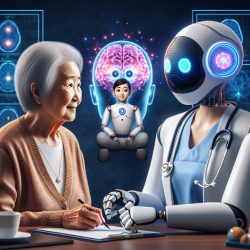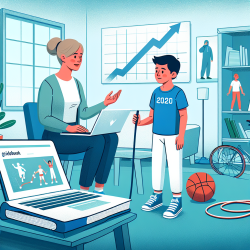Introduction
In the ever-evolving field of speech-language pathology, staying informed about the latest research and technological advancements is crucial. One such area of innovation is the application of artificial intelligence (AI) in healthcare, particularly in the diagnosis and management of dementia. The recent research article, "Artificial Intelligence for Dementia—Applied Models and Digital Health," provides valuable insights that can be translated into the practice of speech-language pathology, especially for practitioners working with children.
Understanding AI's Role in Dementia
The research highlights the significant potential of AI in predicting, diagnosing, and managing dementia. By integrating high-throughput biomarker and electronic health record data, AI models can improve predictive power compared to traditional clinical methods. This is achieved through machine learning (ML) approaches that can distill large datasets into key predictive factors.
Application in Speech-Language Pathology
While the primary focus of the study is on dementia, the methodologies and insights can be adapted for pediatric speech-language pathology. Here are some ways practitioners can apply these findings:
- Data Integration: Utilize AI to integrate diverse data sources such as speech patterns, cognitive assessments, and behavioral data to create comprehensive profiles of children's communication abilities.
- Early Intervention: Just as AI can predict dementia risk, similar models can be developed to identify children at risk for speech and language disorders, allowing for earlier and more targeted interventions.
- Remote Monitoring: Implement digital health tools for remote monitoring of speech therapy progress, providing objective data that can enhance personalized treatment plans.
Encouraging Further Research
For practitioners interested in further exploring the intersection of AI and speech-language pathology, the study encourages collaboration with AI specialists to develop tailored models that address specific clinical needs. Additionally, staying abreast of emerging technologies and participating in interdisciplinary research can lead to innovative solutions that improve therapy outcomes.
Conclusion
AI holds transformative potential for speech-language pathology, offering tools to enhance diagnostic accuracy, personalize treatment, and improve patient outcomes. By leveraging insights from dementia research, practitioners can pioneer new approaches in pediatric therapy, ensuring that children receive the most effective and timely care.
To read the original research paper, please follow this link: Artificial intelligence for dementia—Applied models and digital health.










